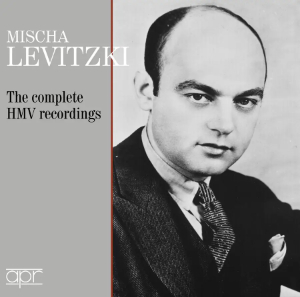
Mischa Levitzki (piano)
The Complete HMV Recordings
rec. 1927-33, London
APR 6043 [2 CDs: 153]
This release presents Mischa Levitzki’s complete electrical recordings made for HMV between 1927-1933.
Levitzki was born in Ukraine in 1898 during a visit his Russian-born yet naturalized-American parents made to their homeland. He started learning the violin but soon switched to the piano, impressing all with his swift progress. He was sent to Warsaw to study with Alexander Michalowski and through him could trace a direct line to Chopin. When the family returned to the States, Mischa continued his studies with Sigismond Stojowski at the newly established Institute of Musical Art in New York, the forerunner of the Juilliard School. Later he travelled to Berlin to enrol at the Hochschule für Musik, where Ernő Dohnányi put the finishing touches to his playing. His career launched, he began concertizing in Germany, Austria, Hungary and Norway. He then settled back in the States. After World War 1 he travelled extensively as far afield as Australia and the Orient. His career was sadly cut short in full flight from a fatal heart attack on 2 January 1941 at the age of only 42. He was also a composer, writing many salon pieces for the piano.
In 1927 he entered into a three-year contract with the Gramophone Company to make recordings for their black “domestic” label. These were set down in London, but were mainly released in Austria, Germany and Australia. The black label was phased out in 1933. His recordings from that year, plus his unissued recordings, were thereafter released on HMV’s International DA/DB series.
Listening to these recordings, one has to make allowances for the occasional finger slip. He was a modest man by all accounts, with a fairly small repertoire. Levitzki’s primary concern wasn’t technical perfection but musical substance. Bryan Crimp, in his booklet note, states that he was “an instrumentalist of arresting originality and deep musical integrity”.
Chopin is heavily featured, and Levitzki was commended throughout his career for his Chopin playing, which displayed both textural clarity and fantasy, elements no doubt inherited from Alexander Michalowski. The three Preludes which open CD 1 have a crystalline translucence. One regrets that he didn’t record the full twenty-four. The two Waltzes are rendered with subtle nuanced rubato. I wasn’t as enamoured with the Third Ballade which was a little short on poetry. The Nocturne In F sharp major, Op. 15 No. 2, however, is tonally pleasing and expressive, and there’s a good handling of the technical hurdles in the middle section. The Polonaise in A flat major Op. 53 I found too stodgy and heavy handed. It just didn’t work for me.
Schumann’s Second Sonata in G minor is a compact, tight structure. It’s not as popular as the First Sonata. I’ve never really enjoyed it, despite Richter’s advocacy. I find it less interesting and less inspired than its predecessor. Nevertheless, what we hear is a gripping reading where the manic is contrasted with the inward. The second movement Andantino, especially, has some beautiful colours and is intensely eloquent.
The performance of the Piano Concerto no.1 in E flat major, S124 sees Levitzki partnered by Landon Ronald at the helm of the London Symphony Orchestra. The inscription was, for some reason, recorded over two venues in November 1929. It’s absolutely terrific and, for me, is the highlight of the set. The pianist is on top form, and there’s some scintillating virtuosity on offer. Ronald is a sensitive accompanist, and the performance reveals a true meeting of minds. Added to this, the piano is perfectly balanced with the orchestra.
Three Hungarian Rhapsodies are featured, Nos. 6, 12 and 13. They’re fully in keeping with the Hungarian character and native musical language. They aren’t note-perfect but are genuinely exciting. Levitzski’s bravura and virtuosity certainly compensates for the odd finger slip. His playing projects well and positively exudes coloristic effects.
The fine transfers by Bryan Crimp and Andrew Hallifax are customarily excellent. Bryan Crimp’s sympathetic notes are helpful in every respect. This splendid twofer just shouldn’t be missed.
Stephen Greenbank
Help us financially by purchasing from



Contents
Beethoven, Ludwig van
Ecossaises, WoO83 (arr. d’Albert)
Chopin, Frederic
Ballades
no.3 in A flat major, op.47
Nocturnes
no.5 in F sharp major, op.15 no.2
no.13 in C minor, op.48 no.1
Polonaises
no.6 in A flat major, op.53 ‘Heroic’
Preludes, op.28
no.1 in C major
no.7 in A major
no.23 in F major
Scherzi
no.3 in C sharp minor, op.39
Waltzes
no.8 in A flat major, op.64 no.3
no.11 in G flat major, op.posth.70 no.1
Gluck, Christoph Willibald
Iphigenie en Aulide
Gavotte (arr. Johannes Brahms)
Levitzki, Mischa
Waltz in A major, op.2 ‘Valse Amour’
Liszt, Franz
Concert Etudes, S144
no.3 Un sospiro
Grandes Etudes de Paganini, S141
no.3 in G sharp minor ‘La campanella’
Hungarian Rhapsodies, S244
no.6 in D flat major
no.12 in C sharp minor
no.13 in A minor
Piano Concerto no.1 in E flat major, S124*
Preludes and Fugues for organ (Bach/Liszt), S462
no.1 in A minor (BWV543)
Mendelssohn, Felix
Rondo capriccioso in E major, op.14
Moszkowski, Moritz
Fantasiestucke, op.52
no.4 La Jongleuse
Rachmaninov, Sergei
Preludes, op.23
no.5 in G minor
Rubinstein, Anton
Etudes, op.23
no.2 in C major ‘Staccato Etude’
Scarlatti, Domenico
Keyboard Sonata in A major, K113
Schubert, Franz
Marches militaires, op.51 D733 no.1 in D major (arr. Carl Tausig for solo piano)
Schumann, Robert
Piano Sonata no.2 in G minor, op.22
Participating artists:
London Symphony Orchestra/Landon Ronald*

















